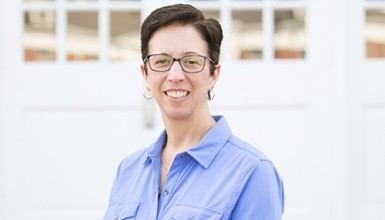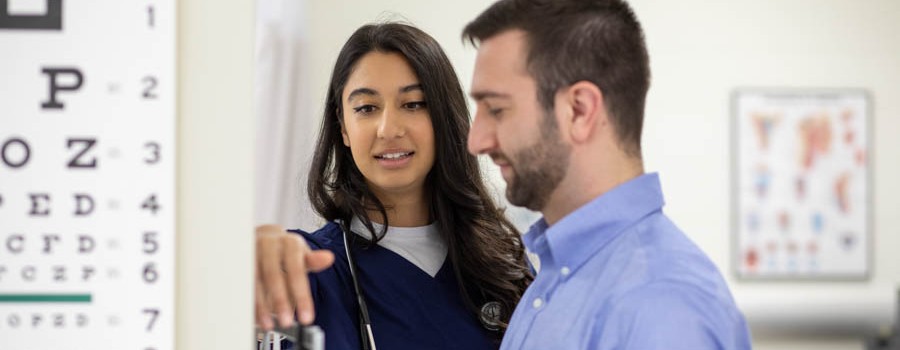Help others improve and maintain their health and wellness!
If your desire is to help people lead better, healthier lives, a degree in public health can set you up for success in a number of careers. In fact, there’s a growing need for these professionals! From nursing homes to fitness training, with a degree in public health education, you’ll be ready to pursue a number of occupations in local health departments, hospitals, health agencies, and more. If your passion is to improve the health and wellness of those around you, a degree in public health - whether you choose to pursue your public health bachelor's degree or associate degree in public health - is the perfect tool to help you help others.
By the numbers
16:1
$48,860
4%
96%
Programs & Requirements
* The credit hours listed on this page only reference the specific program requirements and is not reflective of the total hours necessary to receive your degree. Cumberlands requires all students obtain a minimum of 60 hours for an associate’s degree and a total of 120 hours for a bachelor’s degree. Transfer and prior learning credits may be counted toward those totals.
To learn more about our General Education Requirements, please visit the page referenced below or explore our Academic Catalog.
Bachelor of Science in Public Health
Now is the perfect time to get into public health! According to the Bureau of Labor Statistics, jobs in this industry are growing faster than ever, and opportunities are plentiful. As you pursue your public health bachelor's degree, you’ll study with caring, experienced faculty members who will help you tailor a program of study unique to you and your interests - from community health to public health policy and much more. You’ll learn the skills you need to help others live healthier lives, including the use of technology and communication skills. Cumberlands also provides on-site internship opportunities to help you further your skills in your specific field of interest.
Course Requirements
If someone is double majoring (Public Health and Exercise Sport Science), only the core classes can be duplicated between the majors. There should not be overlapped in elective class hours.
- HESS 333 - Nutrition
- HESS 430 - Substance Abuse
- HLTH 130 - Foundations of Health Science
- HLTH 335 - Introduction to the Study of Disease
- HLTH 336 - Epidemiology
- HLTH 431 - Public Health Administration
- HLTH 432 - Community and Environmental Health
- HLTH 437 - Secondary and Lifespan Health Education
- SOWK 436 - Human Diversity in a Global Society
- BIOL 243 - Introduction to Human Anatomy
- BIOL 244 - Human Physiology
- HLTH 490 - Strategies and Practices for Health Education Professionals.
A Bachelor of Arts requires all the same courses as a Bachelor of Science with the addition of four classes (12 hours) in a foreign language.
Choose one foreign language sequence:
- FREN 131 Elementary French I
- FREN 132 Elementary French II
- FREN 231 Intermediate French I
- FREN 232 Intermediate French II
- SPAN 131 Elementary Spanish I
- SPAN 132 Elementary Spanish II
- SPAN 231 Intermediate Spanish I
- SPAN 232 Intermediate Spanish II
Associate of Science in Public Health
An associate degree in public health will allow you to learn much of the same knowledge and skills you would learn with a bachelor’s in public health degree, but in a more streamlined public health program that takes less time to complete.
Course Requirements
- HESS 333 - Nutrition
- HESS 430 - Substance Abuse
- HLTH 130 - Foundations of Health Science
- HLTH 431 - Public Health Administration
- HLTH 432 - Community and Environmental Health
- Choose 3 Elective Credit Hours of 300/400 level HLTH/HESS courses, or those approved by the Department Chair.
Minor in Public Health
Even a few classes about public health can boost your major and give you knowledge and skills that will benefit the rest of your life.
Course Requirements
- BIOL 243 - Introduction to Human Anatomy
- BIOL 244 - Human Physiology
- HESS 333 - Nutrition
- HESS 430 - Substance Abuse
- HLTH 130 - Foundations of Health Science
- HLTH 335 - Introduction to the Study of Disease
- HLTH 336 - Epidemiology
- HLTH 431 - Public Health Administration
- HLTH 432 - Community and Environmental Health
Take the Next Step
Mission & Goals
The purpose of the public health degree program is to improve health (physical, mental, emotional, social, occupational, and spiritual) through education.
Public Health Careers & Outcomes
All stats from U.S. Bureau of Labor Statistics
Health Education Specialist: $48,860
Health Education Specialist: $48,860
Work in healthcare facilities, nonprofits, public health departments, and more to create wellness programs, work one on one with patients, create materials for learning, and more.
Community Health Worker: $48,860
Community Health Worker: $48,860
Identify health-related issues, collect data, and discuss health concerns within the community.
Epidemiologist: $78,830
Epidemiologist: $78,830
Conduct research and investigate patterns and causes of disease and injury.
Nursing Home Administrator: $101,340
Nursing Home Administrator: $101,340
Manage all aspects of a nursing home facility, including admissions, building maintenance, and care of its residents.
Medical Records Specialist: $46,660
Medical Records Specialist: $46,660
Compile, process, and maintain patient files.
Dietician/Nutritionist: $61,650
Dietician/Nutritionist: $61,650
Work with patients to plan and conduct food service or nutritional programs that will help them lead their healthiest lives.
Common Questions
A public health degree is designed to equip students with the knowledge and skills necessary to improve the health and wellness of communities. The program covers various aspects of health, including physical, mental, emotional, social, occupational, and spiritual well-being. Graduates are prepared to educate and motivate others toward healthier lifestyles, making a positive impact in healthcare facilities, public health departments, and community organizations.
A public health degree typically takes two years to complete for an associate degree and four years for a bachelor’s degree if pursued full-time. This timeline includes general education requirements and specific courses in public health. Prior learning credits and transfer credits can potentially shorten the duration of the program.
Yes, you can earn a public health degree online. Many institutions, including the University of the Cumberlands, offer flexible online options that allow you to complete your studies remotely. This format is ideal for students who need to balance their education with work or other commitments.
A public health degree is worth it if you are passionate about improving the health and wellness of others. The degree prepares you for various roles in a growing field, with opportunities in health education, community health work, epidemiology, and more. It’s a valuable investment for those committed to making a positive impact on public health and community well-being.
With a public health degree, you can pursue careers such as health education specialist, community health worker, epidemiologist, or nursing home administrator. Other roles include medical records specialist, dietician, or nutritionist. The degree offers diverse career paths in healthcare, public health departments, nonprofit organizations, and other settings.
To get a public health degree, you need to enroll in an associate or bachelor’s program at an accredited university. The program will include a combination of general education courses and specialized public health courses that focus on various health aspects. Online options are available for those who prefer a flexible learning format.
Faculty Experts in Public Health
Learn more about the professors you'll interact with in the public health program!

Julia Chaney

Dr. Elizabeth Christopher
Dr. Elizabeth Christopher
Contact Information

Heather Killian
Request Information
Find out all there is to know about our public health degree program. Or any program, for that matter!

